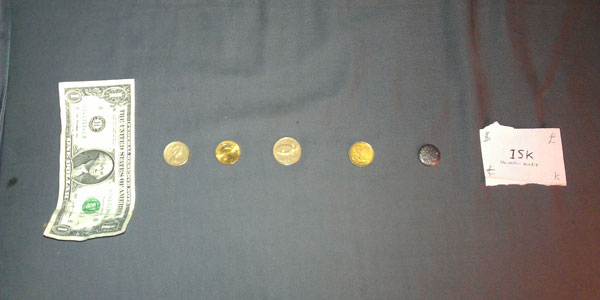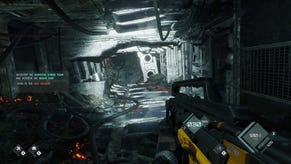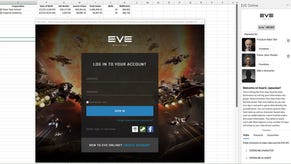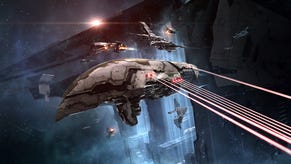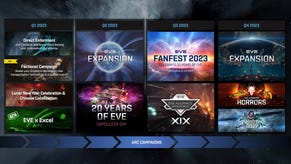EVE Fanfest 2013: The Invisible Hand of EVE Online
Money makes the worlds go round
One of the most fascinating and enduring things about EVE Online is the depth of its economics. The player-driven economy has got a full decade of history behind it, operating on its own strange breed of anarcho-capitalism. In Free Market economics, there is an idea called the ‘invisible hand’. This is the idea that the marketplace ultimately regulates itself, whether it wants to or not. But in EVE’s case, there are two such invisible hands. One guided by the players and the other hand – one which players barely ever notice – guided by CCP’s in-house economist, Dr Eyjólfur Guðmundsson (or Eyjó for short).
Dr Eyjó was at the EVE Fanfest last week, where he was giving talks and presentations on the economic state of New Eden. Professorial and erudite on stage, the Good Doctor showed players endless graphs and charts about the economy, peppering them with jokes about Iceland’s fateful financial collapse in 2008. In one section, he admitted that CCP had even been uncharacteristically ‘hands-on’ within the EVE universe, after they intervened on the market to stop what they saw as a rising bubble in PLEX – a valuable in-game commodity worth weeks of playtime.
Being something of an economic dunce, but also an eager student of mad money, I decided to talk to Dr Eyjó about some of the quirks and quandaries of the EVE market. Read on for his explanation of money, ‘mudflation’ and in-game taxes, how he plans to merge EVE’s economy with that of Dust 514, and why he believes EVE’s ISK is more stable than Iceland’s own króna.
RPS: Hello, doctor. You are an expert on money.
Dr Eyjó: That would be correct, yes.
RPS: So, for those of us who don’t really understand economics very well – what is money?
Dr Eyjó: Money is, we could say, a medium of exchange and somewhere we can store value. If you want to go back in history and think about why people would invent money, imagine that you were a farmer somewhere up in the valley and you needed to go down to the shore and exchange your products for some fish, okay? You have to take your livestock down there, your livestock might die on the way, you will have to feed them, it’s expensive and so on. Once you meet the fisherman, you have to get the fish and he can only really pay you in fish, so you get more fish than you can actually eat yourself before the fish rot. But if the fisherman could sell a lot of the fish to other people and get paid in ‘cash’, he can then pay the farmer in cash and the farmer can then walk back home just with the cash because he has his value stored in something that’s easy to keep and doesn’t decay much over time. This is why gold was so important as a storage of value because gold does not decay and it’s a limited supply.
RPS: But now we just have paper and numbers in a computer and it seems very ethereal.
Dr Eyjó: Maybe it does, maybe it does – but it’s the same system. You just have to have control over the number that you allow to go into the system, and that’s the trick. No governments have, in the long run, been able to withstand the temptation of printing more money. It’s a really, really difficult temptation to withstand.
RPS: I had someone say to me once that ‘money is fiction.’ Is money real? Have I been living a lie?
Dr Eyjó: No, money is real – absolutely real. Because what you can do today is you can go out there and acquire goods with that money. But it’s still – as you said yourself earlier – it’s still just a number, and the question about what the number is is about how [many] total ‘numbers’ there are in the system. So you have to be carefully controlling the amount of money that you put in the system because the amount of money has to be in good proportion to the amount of goods and services and everything that’s in the system.
RPS: Okay, with that in mind, is ISK in EVE any different from real world money?
Dr Eyjó: No. No, there is absolutely no difference. Except for the fact that we don’t allow that money to exit EVE.
RPS: So, ISK in-game is real as well?
Dr Eyjó: [nods]
RPS: So if I went to the Bank of Iceland and said, ‘I have this much EVE ISK’, would they let me open an account?
Dr Eyjó: Unfortunately not. Because we as a company – CCP – we don’t allow you to take it out of EVE.
RPS: That’s very punitive of you.
Dr Eyjó: It’s very punitive. But what we’re trying to do with that is, by having EVE as a closed economic system we can have different rules than in real life. And we want to offer you an alternative experience. We don’t want to replicate real life in EVE. EVE is supposed to be something you can go to and be something completely different. And you need to have rules that are different than real life. This is why if you go into a corporation and you steal something from the corporation, we do not see that as our responsibility – as CCP – to go after you because you stole something from someone in the game. We say: ‘Okay, yeah, he stole from you. It’s up to you to get back at him.’
RPS: So which is a better currency then? In-game ISK or ‘Icelandic króna’ ISK?
Dr Eyjó: Now we’re getting philosophical. But yeah, it’s very very real. Because – this is maybe going to be a little bit technical – I told you earlier that the ISK in EVE, we close it off in our world because we want to keep the rules through EVE. The fact of the matter is that the Iceland Central Bank and the Iceland government have also closed ISK in Iceland. There are currency restrictions because of the financial crisis we had in 2008 and they don’t have – or didn’t have – control of the money. So now there’s a huge pile of money in the system that the Central Bank cannot control unless it just puts everything under restrictions. So, I cannot go into the bank now, give my króna and get dollars – unless I have a reason. I have to say, ‘I have a flight ticket’ then I just get a limited amount and so on, for me as an Icelander.
RPS: What’s the limit on the exchange?
Dr Eyjó: The limit is, I think, three or four thousand Euros per month, or something like that.
RPS: I didn’t know they were so strict.
Dr Eyjó: Yes! And this happened after the last financial crisis. So both currencies – ISK and ISK – are under currency controls and conditions. And there are actually *more people using the ISK in EVE than there are using ISK in real life.*
RPS: Really?
Dr Eyjó: Yes. So you tell me which one is more real.

RPS: Okay, I don’t know. I’ll have to think about it. I’ve heard people talk about the concept of ‘mudflation’ in MMOs. Is that when the price of mud becomes too high?
Dr Eyjó: No, it’s basically what happens when stuff evolves – you get more stuff in and a lot of stuff that used to be good is not so good anymore, so everything just inflates, so when you come into the game as a new player...
[an announcement interrupts the doctor. He patiently waits for the announcement to finish]
Dr Eyjó: So with ‘mudflation’, [the term] relates to the old MUD games – multi-user dungeons – that were just text-based games. If you were coming into the game as a new player after other people had played it for a long while, you would never catch up to them. It was just ridiculous because it just kept growing and growing and it was difficult to get there. In EVE we are very much aware that new players need a path in order for them to participate – they don’t need to be the best right away – but they need to participate in the game. So we designed the game in such a way so that it’s beneficial for old players to get new players with them because they can use them as scouts or they can use them as foot soldiers in bigger battles. And that’s really why we don’t think we would have ‘mudflation’ in EVE.
RPS: So you think EVE is immune to it?
Dr Eyjó: It’s not immune but you do have to be aware of it and design the system so that everybody has a role.
RPS: How much ISK is there?
Dr Eyjó: 650 trillion.
RPS: That’s everything there is in circulation?
Dr Eyjó: That’s all there is in circulation.
RPS: How do you know?
Dr Eyjó: We count it. Every day.
RPS: Every day? But presumably it comes in and out, so it must alter a little?
Dr Eyjó: Yes, yes, on my economic lecture you can see a slide that shows the balance between ‘sinks’ and ‘faucets’ as we call them. A ‘faucet’ is when ISK comes into the game, and ‘sink’ is when it goes out of the game. So we, as I have said, we have a tax – a sales tax – that is there in order to take money out of the system.
RPS: This tax, does it go on hospitals?
Dr Eyjó: [shakes head]
RPS: Roads?
Dr Eyjó: Nope.
RPS: Stargates?
Dr Eyjó: No, no. We can build those for free because we are good at programming. But it’s the same system as in real life. We take a tax to keep the system in balance... We do it in other ways where people are buying services from the computer [NPCs].
RPS: EVE is mostly about players being nasty... well, not ‘nasty’ but it is about them getting one over on their enemies –
Dr Eyjó: No, I think that’s a misunderstanding because, if you think about it, there are Alliances that have two, three, four thousand members.
RPS: But a lot of it is about the pursuit of ISK, right?
Dr Eyjó: No, ISK is a means to an end. They want to control the universe, or they want to beat an opponent in battle. In order to do so they have to have resources. In order to have resources, they have to have ISK. So they are piling on, just letting people create their own mini economic system where they create money – or create revenue.
RPS: It’s like a vicious circle! They want to rule the world to get ISK, but they need ISK to rule the world.
Dr Eyjó: It’s not vicious, it’s perfect! It’s beautiful because that’s the consumption of EVE, it just continues – this is why there’s no endgame, it’s never over. It is a system in itself and I often tell people that the best way to understand EVE is to stop putting a ‘game’ label on it and think of it as a universe. It is a universe in itself.
Dr Eyjó: It’s not even a simulation. Because it’s a universe in itself, it has rules. And it just happens on its own.
RPS: That whole universe is founded on the idea of a Free Market but recently CCP had to ‘intervene’ in the prices of something called PLEX. Can you explain what this was all about?
Dr Eyjó: PLEX is basically a timecode [a subscription – PLEX stands for Pilot’s License Extension and it adds 30 days of game time to your account when ‘consumed’ in-game]. So you can buy, from CCP, one PLEX or five or ten – or whatever you want to buy – and it becomes an item that you can take into the game and you can sell it for ISK in the game. So if you have a lot of US dollars, and I don’t have a lot of US dollars, you can buy two subscriptions – you apply one to yourself, the other one you take into the game and sell it to me for ISK. I buy it for about 520 million ISK today. So, you get a subscription *and* ISK, [while] I get a subscription that I didn’t have to pay US dollars for. I just worked in-game, earned my ISK and used that ISK to buy subscription time.
RPS: So, why did you have to...
Dr Eyjó: Intervene on the market?
RPS: Yes.
Dr Eyjó: The item is sold on an open Free Market. It’s therefore very important, for all of those who depend on having PLEX available, that the price fluctuations are not severe. Because if you have a system where you’re trying to earn money [in-game] to buy your PLEX with ISK and all of a sudden there’s a 50% increase in price, it impacts your ability to be able to play the game because you can no longer afford it. However, the price can change over time and you can adjust your systems to ensure that’s not a problem. But in this case we noticed a bubble being formed and the bubble was being formed because of a broken system in another place in the game. So there was a completely different system that gave people a bigger opportunity to earn revenue, they were using that revenue to invest in PLEXs.
RPS: What was that? What was the thing that players were doing?
Dr Eyjó: In factional warfare – another feature of the game – it was going really, really well but there was just an imbalance in the way [players] were able to acquire wealth through that system. So, we had to rebalance that.
RPS: So they got money too quickly?
Dr Eyjó: Yeah. Yes, you were able to earn too much per-hour. So, they were able to take that money, invest in PLEXs, they drove up the demand for the PLEXs, which increased the prices. So it was a vicious cycle that could have ended by exploding in our face. So we made the decision to go in, supply the PLEXs that were needed – just selling out of our own stock – to stabilise the market. That took a few days and then we had a fix already available, we got that ready, got that sent into the code, and about a week or ten days later the system was fine and it went back to its normal activity.
RPS: But then, where did you get the PLEXs for yourself from? Did CCP just ‘print’ those?
Dr Eyjó: No. We don’t print those because we only allow PLEXs to go into the system that are bought with real life money. So, our way to do it is to buy it off the [in-game] market and keep it in stock ourselves – so exchange ISK for PLEXs. Or we can reutilise PLEXs that are found on, uh... *other* accounts. That are perma-banned. We can acquire those assets.
RPS: So you’re not printing money. It’s a completely different thing?
Dr Eyjó: It’s a completely different thing. But we may impact the ISK supply by trading on the market as well, we would be printing ISK to get PLEXs out of the market. Which we do not want to do.
RPS: Why not?
Dr Eyjó: Because we want the system to be self-sufficient and sustain itself.
RPS: You also now have the Dust 514 economy – for the PlayStation 3 game that is tying into EVE. Do you have to try and add that economy into EVE?
Dr Eyjó: Well, not ‘into’ but [we have to] have them connected to each other, like two countries doing international business.
RPS: During the lecture that you gave about this, you said it was like a big country and a small country... joining currency, or something?
Dr Eyjó: Yep.
RPS: And then you made a joke about Iceland that everybody in the room laughed at but I didn’t understand. What was the joke about?
Dr Eyjó: So, in 2004 to 2007 Iceland was able to acquire a lot of international loans from foreign countries. A lot of money. Lehman Brothers, Deutsche Bank, they were all willing to lend Icelanders Euros or Dollars and different kinds of currencies, because everybody believed that Iceland would just flourish forever. And the money supply in Iceland – because that’s money from the outside pumped into Iceland – just sky-rocketed. And having a sky-rocketing money supply means there’s more money in the system but there’s still the same economic value. So the joke that I was making was very simple: That system blew up. And they should have known it was going to blow up. EVE has a lot of ISK in it because of ten years of history. A lot of ISK in EVE can mean a hell of a lot coming to Dust. And we don’t want that money to move too fast into the [new] game because it will ruin the economy of ‘slow growth’, so we have to know the balance before we completely open it up.
RPS: Otherwise Dust might need a bailout.
Dr Eyjó: Otherwise Dust might need a bailout. Or it just might not be interesting for players because there’s always this rich EVE player who comes in and buys everything.

RPS: Would you like the real world economy to be more like the EVE economy?
Dr Eyjó: I would like the real world economy to take into account a lot of things that you can find in EVE and see if it couldn’t work in real life.
RPS: But you wouldn’t like people to kill each other for money and not get reprimanded.
Dr Eyjó: No. We’re not talking about that. Just talking about the economic system.
RPS: I want to test something with you.
Dr Eyjó: Okay.
RPS: I want to see what currencies are the best. I have here a selection of currencies. [Gets up and lays out seven ‘currencies’ on the seat] This is a dollar. I’ve got an Icelandic króna. A one pound coin. I think this one is a Russian ruble. Then this is, uh, play-money.
Dr Eyjó: [picks up and inspects plastic disc with ‘£1’ stamped on it] Ah yes, okay.
RPS: This one’s a watch battery. And then finally, this paper represents ISK – Interstellar Kredits.
Dr Eyjó: Mm-hmm.
RPS: So which is the best one?
Dr Eyjó: The one that you trust the most in. The one that you believe will be, one year from now, something that you can purchase goods with.
RPS: Which one do you put most of YOUR trust in?
Dr Eyjó: Which one do I put most of my trust in? At this point in time? Well, definitely not the battery [pushes watch battery away]. The battery will run out and there’s very few people that will accept it as a payment.
RPS: It has actually run out already.
Dr Eyjó: Right, so it has no functional value and therefore it has no trade value either because there’s nobody who can claim anything from it.
RPS: Okay, we’ll throw that away.
Dr Eyjó: Okay. Play money does not work for me [pushes plastic coin away]. Because I don’t know what’s behind it, I don’t know how many ‘play monies’ are out there and I don’t know who would accept it as a payment.
RPS: Well, that’s the only one I’ve got personally.
Dr Eyjó: Okay. The Russian ruble I would trust rather than the Iceland króna. The Iceland króna is very unstable and is under currency restrictions, so I’ll put that away [flicks króna away].
RPS: Okay.
Dr Eyjó: The pound and the dollar are kind of equal, both have a government behind them who you kind of trust – not completely – but you kind of trust them so you’re quite sure it’s going to happen.
RPS: So what about Interstellar Kredit?
Dr Eyjó: Hang on, hang on. The Russian ruble. I would not trust the Russian ruble compared to the dollar and the pound, simply because it’s under restrictions as well and is fluctuating [dismisses the ruble]. I would trust this one! [picks up paper marked ‘Interstellar Kredit’]
RPS: The most!?
Dr Eyjó: Yes. Because this is the one I have control over and I know in a year’s time I can definitely buy a spaceship for it. In a year’s time the dollar might have reduced in value and in a year’s time the pound might have reduced in value.
RPS: Okay, one final test. These are all the currencies [slides coins back into place]. Let’s play ‘real or fake’. The dollar, real or fake?
Dr Eyjó: It is as real as people believe it is.
RPS: Pound coin, real or fake?
Dr Eyjó: Same answer, it’s as real as people believe it to be.

RPS: Is this going to be the answer for all of them?
Dr Eyjó: No.
RPS: Króna, real or fa–
Dr Eyjó: Fake.
RPS: Okay! Russian ruble, real or fake?
Dr Eyjó: It’s kind of real, but not completely.
RPS: Play money, real or fa–
Dr Eyjó: Fake.
RPS: Battery, rea–
Dr Eyjó: Fake.
RPS: Right. Interstellar Kredit?
Dr Eyjó: Real.
RPS: Real? Even moreso than the króna?
Dr Eyjó: Definitely more real because I will be able to buy a spaceship. There will be people around next year who will be willing to accept this one as payment for a spaceship.
RPS: Dr Eyjó, thank you for your time.


